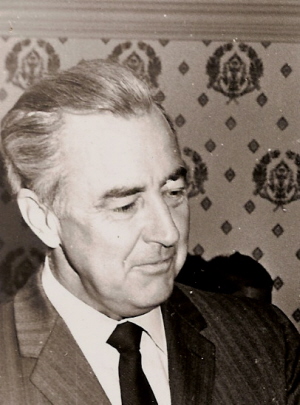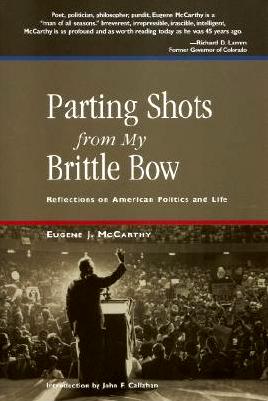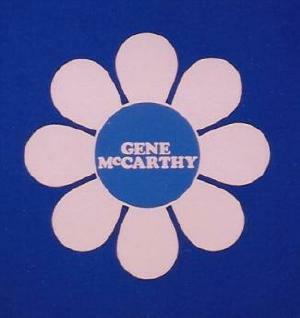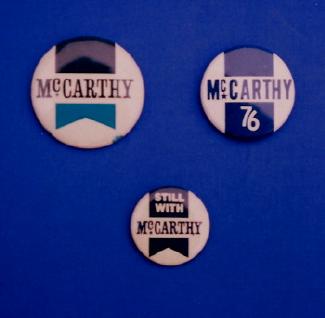 The writer worked in the 1968 and 1976 McCarthy presidential campaigns and did research and other work for Mr. McCarthy in the 1970s. The following was posted in 2006. Gene McCarthy's Different Drummer Mary Meehan Former Senator Eugene J. McCarthy (D-Minn.), who died in December 2005 at age 89, is remembered chiefly for his 1968 challenge to President Lyndon B. Johnson and the Vietnam War. His '68 campaign ranks among the great ones. There was, though, much more to a political career that included ten years in the House of Representatives and twelve in the Senate. McCarthy was a "policy wonk" before the term was invented, always deeply interested in issues and their real-life effects on the people he represented. As a young House member, he organized a band of liberal Democrats, "McCarthy's Mavericks," who put together a legislative program and who later became the Democratic Study Group. In the Senate, he was deeply involved in issues of economics, which he had taught at the college level, and foreign policy. He also wrote about twenty books over the years, mainly on serious political issues. Yet there were also books of poetry; a delightful book of children's stories; a Minnesota memoir in poetry and prose; and two books of essays about rural Rappahannock County, Va., where he lived for many years. His last book, an anthology, is called Parting Shots from My Brittle Bow (Fulcrum Publishing, 2004). The title is based on a McCarthy poem about courage in one's later years. More specifically, it's based on a line that should hearten all aging activists, including those who worked for him in '68: "The last shot from the brittle bow is truest."  When McCarthy was a senator in the late 1960s, many people in high places--including President Johnson himself--knew the Vietnam War was a disaster, but were afraid to say so out loud. Others, including many of McCarthy's Democratic friends and colleagues in the Senate, spoke against the war but were unwilling to risk a total break with Johnson. (LBJ was a wounded bear, yet one who could still maul a senator badly.) But McCarthy could see that talk alone wouldn't change the war policy, while a direct political challenge to Johnson in the 1968 Democratic presidential primaries had a chance of doing so. His challenge was a brave one, and at first rather lonely. He joked that people found it hard "to support me by daylight." But many soon rallied behind him for the long campaign from the snows of New Hampshire to the convention in Chicago. Still, it was not easy to face--within just a few months--three candidates as formidable as Lyndon Johnson, Robert Kennedy, and Hubert Humphrey, plus the establishments of the Democratic Party and the AFL-CIO. McCarthy did not end the war, nor win the presidential nomination; but he toppled a president and started the Democratic Party on a path that led to its rejection of the war. His 1968 campaign brought many new people, especially young people, into politics. And by his challenge to archaic and unfair primary rules, he helped make the Democratic party more truly democratic. But he was never an enthusiast for managed results. In 1974 he remarked, "What the Democrats now seem to be talking about is a quota system. And if you carry that to the ultimate, you really ought to run all Democrats through some kind of selective process--a sort of computer system--and just take out those who are thrown out by the machine and say, 'Go to the Convention.' You might run it once more and take the last person as the candidate." McCarthy should also be remembered for his challenge to the roots of war. He and colleagues such as the late Senator J. William Fulbright, an Arkansas Democrat who chaired the Senate Foreign Relations Committee, spoke of deeper problems that led to Vietnam--what Senator Fulbright called the "arrogance of power" and what both saw as the over-extension of America's military presence abroad. They worried about direct American intervention, but also about U.S. arms sales abroad and the way they encouraged wars in poor nations. They understood the dangers of ideological war. As McCarthy wrote in "Ares," a fine antiwar poem, "ideologies do not bleed/they only blood the world." Today, when we are mired down in yet another war, many of us wish that Americans had listened more closely to McCarthy and Fulbright. President Bush and his advisers deserve great blame for the current war in Iraq. Yet they are continuing an overblown foreign policy that goes back many decades and has deep roots in both political parties. Unless both parties recognize the practical and ethical limits on American power, we will be involved in another war soon--and then another. Gene McCarthy saw politics as a high calling, one that offers a chance to bring "reasoned judgment" to bear on great issues. He believed politics can and should be an honorable profession, so long as one avoids the temptation to demagoguery, on the one hand, or betrayal of principle, on the other. He did not see political defeat as the end of the world; he knew that some issues are so great that it's worth risking defeat over them. He had remarkable freedom from the typical obsessions of politics, such as the opinion polls that run so many political careers these days. (One could argue, though, that he had too much freedom from good counsel. Had he more often sought advice from friendly Senate colleagues and others who wished him well, he might have avoided some major political mistakes of 1968-69. Those mistakes ended his chance to be an influence in the Democratic Party and handicapped his later effort outside the party.)  He was not afraid of power, but understood that a lust for it can lead to great evil. In his poem, "Lament of an Aging Politician," he wrote that "I cannot write Act III." Some thought the last line suggested a Hamlet-like indecisiveness. When asked what it meant, though, McCarthy responded: "People who want to write Act III write tragedy." Later he said that "politics is always in the second act of a three-act play....But if you get Bush [the first President Bush] talking about the new world order, that's third-act stuff. Hitler was a third-act politician, as was Napoleon; they had the idea that you'll finish the job forever. You won't." This is a deep truth about politics and one that political activists, whether liberal or conservative, should ponder. They should also consider McCarthy's sane remark that "I had no boyhood dream of being President of the United States. I wanted to be the first baseman for the New York Yankees. I think that's the kind of dream you ought to have when you're young." Had he been elected president, he would have upheld the dignity of the office yet tried to reduce the pomposity and imperial distance that now affect it. During the 1968 campaign, he often promised to take down the fence around the White House and have picnics on the lawn. Later he declared that he would "take out the White House rose garden" and "replace it with humble vegetables like cabbage and squash." He added: "You'd have trouble announcing war in a cabbage patch." Although a liberal, and proud of it, McCarthy had a healthy streak of conservatism. This was evident in his great concern about the state of our political and social institutions: the presidency, the Congress, political parties, universities, corporations, and others. Institutions, he wrote, "are always under threat from the barbarians, and sometimes from the intellectuals. Once an institution is abused or destroyed, dangerous powers can be unleashed.... Rather than destroy our institutions, what we must do is restore their integrity, perfect them, and preserve them for the long haul." Disturbed by the policies of both major political parties--and by their stranglehold on national politics--McCarthy ran for president as an independent in 1976. His campaign went nowhere in electoral terms, but it knocked down many barriers to independent candidates through a series of ballot-access lawsuits. As in 1968, he did not reach the promised land himself, but helped open the political process for others. He also joined then-Senator James Buckley (R-N.Y.) in a major challenge, on First Amendment grounds, to the 1974 campaign finance law. McCarthy realized that governmental regulation of politics involves many dangers. "I'm holding out for the freest kind of politics at the national level," he said. "Once you give that up, you get pretty much into the second stage of the French Revolution, where everybody was equal, especially after they had their heads cut off." The Buckley v. Valeo lawsuit did not overturn virtually the entire campaign law, as the plaintiffs had hoped. Yet it created some breathing space and running room for challengers and for citizens acting independently of campaigns. Again, McCarthy helped clear the way for others. Our politics are still not as free and open as they should be. Yet they are more open than they would otherwise be because McCarthy was willing to take on the political establishment and shake it up. Henry David Thoreau said that a man who has a different drummer should "step to the music which he hears, however measured or far away." More than any politician of our time, Gene McCarthy followed that advice. It was an honor to work for him.
 |